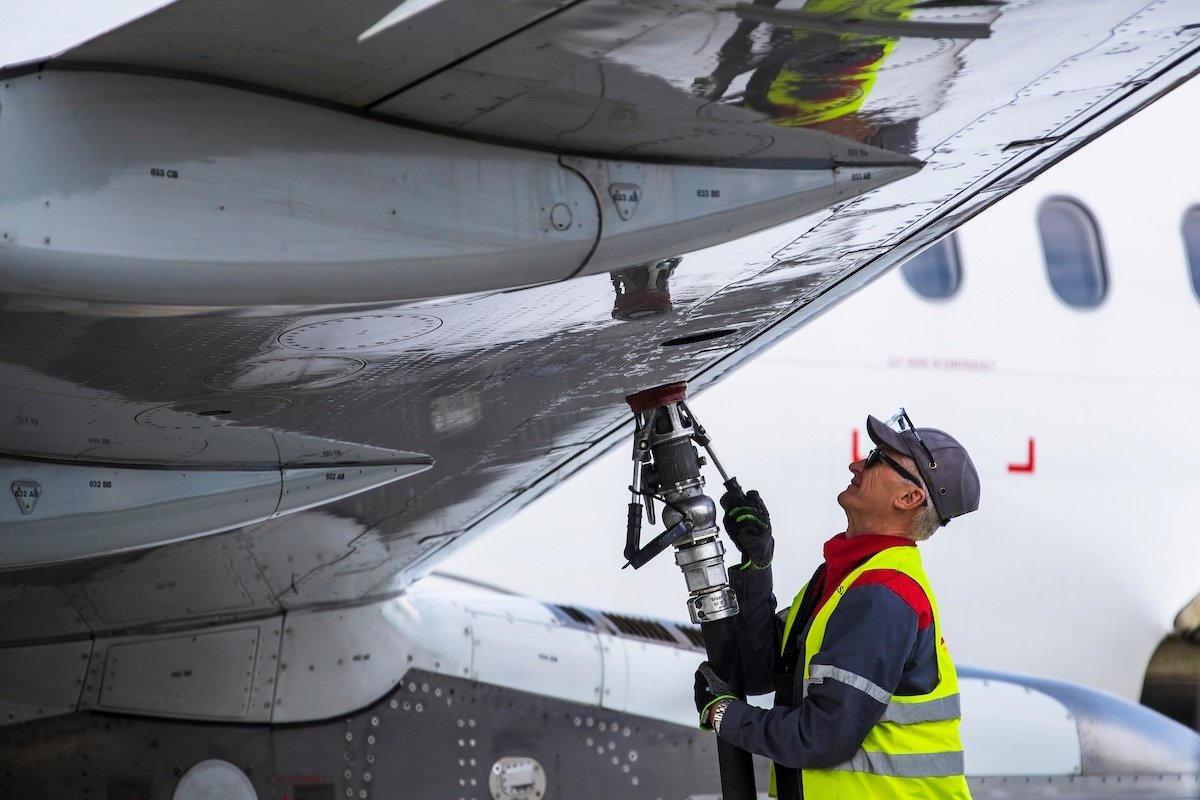A U.K.-based tech company is transforming how airlines keep track of fuel for their airplanes, a process one co-founder said remains surprisingly archaic for many carriers and the airports and fuel companies they coordinate with.
“When we started, the goal was to bring real-time technology, mobile technology, to an industry that was very paper-driven, very manually processed across the world, and still is to some extent,” said Alex Mattos, chief operating officer at i6 Group. “Some places are very digital, some places are still paper and pencils.”
i6’s suite of cloud-based software products handles every aspect of the aircraft fueling process, tracking how much fuel has been delivered, how much is in a customers’ airplanes, and how much the customer has left at a given location. The technology suits the immediate purpose of getting aircraft fueled up and ready to fly, but it also captures data from airlines, airports, and into-plane operators to help reconcile stock, pay bills, and identify inefficiencies.
“About 30 to 35 percent of an airline’s bottom line is their fuel cost,” Mattos said. “So it’s a big number. You want to make sure that you’re not wasting it. And that’s before we even talk about sustainability.”
Mattos cofounded i6 in 2013 after working in aerospace and defense electronics. Part of his work involved testing fuel systems on military aircraft, and while an early effort to translate that technology to the civil market didn’t meet with success, it gave Mattos and business partner Steve Uhrmacher a window into the inefficiencies in commercial aircraft fueling.
“We got exposed to the process, and we can’t believe there’s so much paper,” Mattos said. “We can’t believe this takes so long, for such a huge spend and a huge part of aviation. And we’re still people driving paper around, people refiling bits of paper, waiting four weeks for it to get back to a fuel team before they can reconcile invoices.”
In the years since, i6 has rolled out products like Fusion6, an into-plane refueling management system used by workers who fuel aircraft. The software records the distribution of fuel, connects data from airports to airlines, and gives clients visibility into where their employees are and how they’re managing their tasks.
“We build a single picture of the truth in order to refuel the airplanes,” he said. “We can say, ‘This is the best schedule for you. You’ve got 500 planes to do today, you’ve got 30 guys to do it with, and here’s the best way of moving around the airport, the best order with the right people.”

Another tool, eHandshake, allows a pilot to interact digitally with a refueler, which removes the need for paper and reduces the risk of overfueling. Pilots can also confirm the fuel order remotely.
In case studies, i6 has found that its products increase fuel efficiency, reduce fueling delays and invoice errors, and improve on-time performance, with a 17-minute reduction in turnaround for long-haul flights and a five-minute improvement for short-haul flights.
Those results have helped i6 win contracts and partnerships with some of the busiest airlines in the world, including Delta, JetBlue, Air Canada, WestJet, British Airways, Aer Lingus, Cathay Pacific, Lufthansa Group, and Virgin Atlantic, among others.
i6 is now ready to scale up rapidly, Mattos said. The company is working to bring new airlines onto its platform, crack open new markets, and expand beyond just fuel. It plans to apply its technology to deicing fluid and to the logistics needs of private airports and fixed-based operators, all the way up to the food and drinks needed for in-flight catering.
“We’re in 220 locations, and we want that to be in the thousands,” he said.
AI Integration
Like many other companies in the aviation world, i6 is looking at applications for artificial intelligence.
Mattos said the company is currently testing and integrating some AI features in software development and quality testing. Over time, the technology could be used to identify broader patterns that create inefficiency and waste.
“It could say, ‘You always overfuel this airplane, why do you do that?’” Mattos said. “‘This one’s always late, why?’ There, we really do see the deployment of AI over the next eight to 12 months as something we can look at.”

Still, the company will proceed cautiously, since the data it collects for customers is commercially sensitive and can’t be plugged into an AI program. The bigger opportunity may be in machine learning, which could help users refine their workers’ schedules.
“We have to be careful about just throwing AI at the problem,” Mattos said. “It’s not deciding how much fuel goes in a plane. We will never give that over to an AI algorithm, in my view of the world. But actually in terms of saying, you need this many guys, or this is a better shift pattern, or you don’t need so many vehicles, I absolutely see us using more of that scheduling algorithm.”
Middle East Expansion
Earlier this week, i6 announced a new partnership with the Arabian Petroleum Supply Company, also known as Apsco, to digitize its fuel operations across Saudi Arabia. Apsco is the largest private-sector company in the aviation fueling industry in the kingdom and manages 20 depots at international, domestic, and regional airports there, including King Abdulaziz International Airport (OEJN) in Jeddah and King Khalid International Airport (OERK) in Riyadh.
I6 plans to have Apsco added to its network by the end of the year. Its tools will replace a mix of legacy systems and paper-based workflows.
Mattos said the company will continue to look for growth opportunities around the world, particularly in the Middle East and Latin America in the near term.
“We can deliver bigger benefits to the airlines if we can be at more locations,” he said. “Our vision is for that global network, so that wherever that airline flies they get the same value as at their hub location.”




